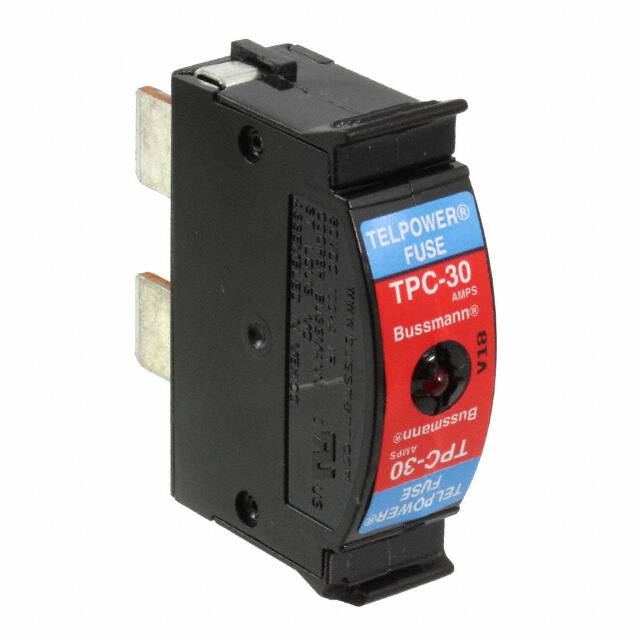TPC-30 Product Overview
Introduction
TPC-30 is a versatile electronic component that belongs to the category of programmable logic controllers (PLCs). This entry provides an in-depth overview of TPC-30, including its basic information, specifications, detailed pin configuration, functional features, advantages and disadvantages, working principles, application field plans, and alternative models.
Basic Information Overview
- Category: Programmable Logic Controllers (PLCs)
- Use: TPC-30 is used for automation and control applications in various industries, including manufacturing, energy, and infrastructure.
- Characteristics: TPC-30 is known for its high processing power, flexibility, and reliability. It offers seamless integration with different systems and supports a wide range of input/output options.
- Package: TPC-30 comes in a compact and durable housing, designed to withstand harsh industrial environments.
- Essence: The essence of TPC-30 lies in its ability to streamline complex control processes and enhance operational efficiency.
- Packaging/Quantity: TPC-30 is typically packaged as a standalone unit or as part of a larger control system, depending on the specific application requirements.
Specifications
- Processor: TPC-30 is equipped with a powerful multi-core processor capable of handling complex control algorithms and data processing tasks.
- Memory: It features ample onboard memory for storing program logic, data, and configuration settings.
- Communication Interfaces: TPC-30 supports various communication protocols such as Ethernet, Modbus, and Profibus, enabling seamless connectivity with other devices and systems.
- Input/Output (I/O) Options: It offers a diverse range of digital and analog I/O options to accommodate different sensor and actuator interfaces.
- Operating Temperature Range: TPC-30 is designed to operate reliably within a wide temperature range, making it suitable for both indoor and outdoor applications.
Detailed Pin Configuration
The detailed pin configuration of TPC-30 includes specific pin assignments for power supply, communication interfaces, I/O connections, and other relevant signals. Refer to the product documentation for comprehensive pinout details.
Functional Features
- Programmability: TPC-30 can be programmed using industry-standard software tools, allowing users to create custom control strategies and logic sequences.
- Real-Time Operation: It offers real-time control capabilities, ensuring precise and timely execution of control tasks.
- Diagnostic Capabilities: TPC-30 provides extensive diagnostic features for monitoring system performance and detecting potential issues.
- Remote Access: It supports remote access and monitoring, enabling operators to oversee control processes from a centralized location.
Advantages and Disadvantages
Advantages
- High processing power for demanding control applications
- Flexible I/O options for versatile system integration
- Robust construction for reliable operation in industrial environments
- Extensive communication protocol support for seamless connectivity
Disadvantages
- Initial setup and programming may require specialized expertise
- Limited onboard I/O capacity for extremely large-scale applications
Working Principles
TPC-30 operates based on the principles of programmable logic control, where user-defined logic and control algorithms are executed in response to input signals, enabling precise control of industrial processes and equipment.
Detailed Application Field Plans
- Manufacturing: TPC-30 can be deployed in manufacturing facilities for process control, material handling, and machine automation.
- Energy Sector: It is suitable for controlling power generation, distribution, and renewable energy systems.
- Infrastructure: TPC-30 can be utilized in building automation, HVAC control, and facility management applications.
Detailed and Complete Alternative Models
- Model A: Offers expanded I/O capabilities for larger-scale applications
- Model B: Focuses on enhanced communication features for networked control systems
- Model C: Designed for ruggedized environments with extended temperature tolerance
In conclusion, TPC-30 is a highly adaptable PLC component with advanced features and robust construction, making it well-suited for a wide range of industrial automation and control applications.
[Word Count: 611]
技術ソリューションにおける TPC-30 の適用に関連する 10 件の一般的な質問と回答をリストします。
Sure, here are 10 common questions and answers related to the application of TPC-30 in technical solutions:
What is TPC-30?
- TPC-30 is a type of thermoplastic compound commonly used in technical applications due to its high strength and heat resistance.
What are the key properties of TPC-30?
- TPC-30 exhibits excellent mechanical properties, chemical resistance, and thermal stability, making it suitable for demanding technical solutions.
In what technical applications can TPC-30 be used?
- TPC-30 is commonly used in automotive components, electrical insulation, industrial machinery parts, and aerospace applications due to its robust nature.
How does TPC-30 compare to other thermoplastics in technical solutions?
- TPC-30 offers superior mechanical strength and thermal resistance compared to many other thermoplastics, making it ideal for challenging technical environments.
What are the recommended processing methods for TPC-30?
- TPC-30 can be processed using injection molding, extrusion, and compression molding techniques, providing versatility in manufacturing technical components.
Does TPC-30 require any special handling or storage considerations?
- TPC-30 should be stored in a dry environment away from direct sunlight and extreme temperatures to maintain its properties before processing.
Can TPC-30 be combined with other materials in technical solutions?
- Yes, TPC-30 can be compounded with additives or blended with other polymers to enhance specific properties for different technical applications.
What are the temperature limits for TPC-30 in technical applications?
- TPC-30 can typically withstand continuous use at temperatures ranging from -40°C to 150°C, making it suitable for various technical environments.
Are there any safety considerations when working with TPC-30 in technical solutions?
- Proper ventilation and personal protective equipment should be used when processing TPC-30 to minimize exposure to fumes and dust particles.
Where can TPC-30 be sourced for technical solution development?
- TPC-30 can be sourced from reputable polymer suppliers and manufacturers specializing in technical-grade thermoplastic compounds.


